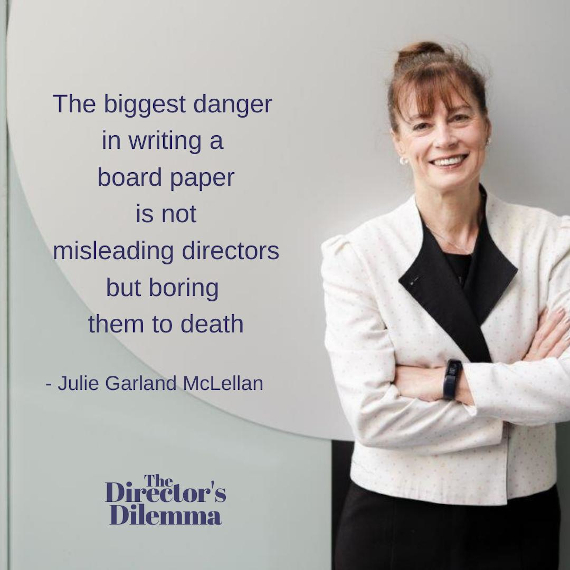|
|
|
|
|
|
|
|
|
Dear reader,
Welcome to The Director's Dilemma October 2022
Each month this newsletter looks at a real-life scenario that happened to a board, perhaps to a board like yours, and considers a range of responses. The scenarios are de-identified to protect the individuals concerned. This month we look at how to proceed when you suspect the executive may not be totally transparent with information they share.
The advice is general and designed to start your own thinking about how this could be approached in your personal context. If you would like specific advice, I work with boards and directors as a confidential mentor to help them build great companies and maximise their impact, and am an experienced board mentor; please call me.
To read this email in a web browser, go to www.mclellan.com.au/newsletter.html and click on 'read the latest issue'. I hope you will enjoy the latest dilemma:
 Whitney is a director on the board of a large government owned utility business. She loves the challenge of the role and the ability to contribute to the provision of an essential service. Lately, however, she has begun to suspect that the board papers are not reporting all the facts. Risks appear understated and stakeholder interactions are all positive. Whitney is a director on the board of a large government owned utility business. She loves the challenge of the role and the ability to contribute to the provision of an essential service. Lately, however, she has begun to suspect that the board papers are not reporting all the facts. Risks appear understated and stakeholder interactions are all positive.
In the latest pack there is a paper that talks about a new project. Whitney is aware that several organisations tendered for the work and were surprised not to be shortlisted or granted a meeting to debrief on the tender. The paper provides a list of three organisations that tendered for the work and omits all mention of the ones she knows tendered unsuccessfully. It recommends, based on the selection criteria, that the project be awarded to the best of those three.
The company that the board is asked to approve the award of the contract is a reputable one and has done business in the past with Whitney's company and many others. They are definitely a worthy business partner. Still, she is concerned that there is no mention of the other unsuccessful tenderers.
Whitney is reluctant to make any accusations, but also reluctant to sign off on awarding a contract when she believes management might have obfuscated some of the pertinent information.
What should she do?
|
|
|
|
Brian's Answer
 I see the matter of whether management is fully disclosing all relevant material to the Board as a very serious issue that goes to good governance, management's credibility and trustworthiness. I see the matter of whether management is fully disclosing all relevant material to the Board as a very serious issue that goes to good governance, management's credibility and trustworthiness.
The critical issue is to determine whether relevant information has been withheld and, if so, why and by whom.
The Board should find a plausible reason to defer making a decision on awarding the contract. They should immediately commission the internal auditors to perform an urgent review of the entire procurement process around that project. Their brief would include discovering any relevant information that had been withheld.
The auditors must then report back to the Board before any decision is made on awarding the contract. The Board may, or may not, choose to inform management about the audit and its scope.
As the matter has been presented to the Board as a formal report, I assume the CEO and Company Secretary (and perhaps other executives) have signed off on the paper before it was tabled. They each should be separately questioned by the Board after the auditors' report is received.
Any further sanctions would depend on what information was withheld, the reason, and by whom.
The process undertaken by the Board must lead to confidence that all relevant information is being tabled.
Do-nothing is not an option.
Brian Hood is a director and co-chair of a company that operates a Bendigo Bank franchise, a Councillor of Hepburn Shire Council, and a former high-profile whistle-blower uncovering tendering irregularities at Note Printing Australia. He lives in Trentham, Victoria, Australia.
|
|
|
|
Julie's Answer
 Whitney needs to be careful that she doesn't make any unfounded, and potentially defamatory, statements. She should start by documenting what she knows and how she knows it. Whitney needs to be careful that she doesn't make any unfounded, and potentially defamatory, statements. She should start by documenting what she knows and how she knows it.
If possible, she should seek the primary source of her information about the other unsuccessful tenderers and get clear statements about whether the tenders were compliant, timely, etc. If not, she should write down who told her the information, when, and under what circumstances. She needs to clearly identify facts and assumptions.
Once she has all the facts she can gather, if there is still a cause for concern, she should check with her colleagues if they have any similar misgivings about the papers. Is this a pattern or a single incidence of concern?
Then she should approach the chair and ask that the matter be discussed in-camera by the board before speaking with a united voice to the CEO and prior to launching an official investigation, ideally with an independent expert investigator.
Hopefully, this is just a case of sloppy reporting of a two-stage process or unfounded gossip. If it is proven that the tender was handled wrongly, then there is serious misconduct that will need to be carefully put right. It could be that the tender will need to be annulled, the successful party compensated (if they were not involved in any fraud), and a new tender process started.
Regardless of the outcome of her diligent research into the matter, Whitney needs to work carefully and document her steps.
Julie Garland McLellan is an experienced non-executive director and board advisor based in Sydney, Australia. She travels the world providing director education and board development.
|
|
|
|
Jaco's Answer
 As this is a Government-owned utility, it's important for the Board to have full oversight of tenders - ensuring a fair process and that decision-making factors are factual and defendable. As this is a Government-owned utility, it's important for the Board to have full oversight of tenders - ensuring a fair process and that decision-making factors are factual and defendable.
Scenarios to consider:
-
If the Chair is a strong and objective leader, Whitney should raise her concern with the Chair prior to the Board meeting. The Chair will request the CEO provide relevant information on the unsuccessful companies. It is easy to justify the request to the CEO, as a perception that the Company was unfair in awarding a tender or can't clearly explain the decision might create a reputational risk;
-
If the Chair is not a strong and objective leader, and perceived to lack the required authority, Whitney should consult the other independent Non-Executive Board members. If there are other concerned Board members, they could jointly request the CEO provide the additional information prior to the meeting, copying the Chair;
-
If none of the above options are possible, Whitney should request the information from the CEO prior to the Board meeting and copy the Chair on the correspondence;
-
If Whitney does not get the necessary response and support from the CEO, she should formally raise it at the Board meeting. If she does not get the necessary answers during the Board meeting, her concern should be recorded as part of the Board minutes. As a last resort she should then seriously consider her resignation, stating her reasons in writing. Her further participation as a Board member will be untenable as there is a serious breakdown in trust, which will be difficult to restore.
A lasting governance structure, post this issue, could take the following format:
-
The Board review the procurement policy and delegation of authority;
-
Tenders above a certain amount should be presented to the relevant Board Sub-Committee for approval (delegation of authority);
-
General information to be included in all tender reports to the Board: e.g. criteria, number of applicants, short-listed applicants and those companies that were turned down.
Jaco Kriek is Managing Director of Search Partners International and a director of AltoPartners. He is based in Johannesburg, Gauteng, South Africa.
What's online - My recent post calling out the propensity of fund managers to take credit for strategies that boards have endorsed (and that management have carefully analysed and implemented) has overtaken my video on what to look for when hiring a new company secretary to become the most popular item I have ever posted.
Video library - You might like to visit and subscribe to my YouTube channel to see all the videos on practical boardroom issues. There are now over 60 short videos on a range of board topics. Let me know of any topics you would like to see addressed and I will see if I can make that into a video for you. There are also some full-length videos of courses and conference presentations plus my candid thoughts on boards in the news. Please subscribe as I'm trying to build the channel. I promise I won't send you spam from YouTube!
Be a contributor - if you would like to attempt a response to the dilemmas for publication you will be most welcome. Simply reply to this email and let me know. I am always on the look out for new talent from around the world so please reach out if that sounds like something you could do. I am also always grateful for the generous sharing of the current and past contributors. I couldn’t create such an engaging newsletter without their help.
Let me help you - I would be delighted to speak for or train your board, staff, audience and/or group. My work covers director and whole board development and mentoring, board reviews, recruitment, and training executives in writing board papers. If I can help, please contact me at julie@mclellan.com.au.
|
|
|
|
Book (Video) Review - Carlos Ghosn; The last flight.

Coming home from a much-anticipated holiday in Europe I had the opportunity of watching this video and gaining a few more insights into the saga that had me (and possibly you also) riveted as it played out on our TV, print and radio news.
I was hoping for some glimpses into what the board was up to. Alas, the board was nowhere to be seen. The few references to it were perhaps indicative of how the scandal could have occurred - one director mentioned that Carlos Ghosn was 'my boss'. Since when is the CEO the boss of a board member? The former chair mentioned that he respected Carlos for his performance but couldn't (even after prompting from the interviewer) say that he liked or admired him. Since when would a board appoint a chair whom they didn't like and admire and whose ethics they considered questionable?
The scandal arose from claims that Carlos had under declared his income in corporate reports. It was also alleged that he had misused company property and privileges and that his compensation was "unjustifiably high". A good board should review and agree the CEO's compensation and then make sure it is accurately and intelligibly reported. They should also set his or her targets to include a balanced range of measures, not just the financial ones that seemed to drive Mr Ghosn's behaviour. And, of course, no good board would ever appoint someone - no matter how clever and useful - if he or she didn't have an ethical frame that was compatible with their own.
Watch it, it is fascinating, and then ask yourself "What did I not see in this documentary?"
You will learn something, even if it is only a clearer picture of what you already know and therefore rarely question.
Available at Amazon Prime Video
Inspirational quote for October

Focus your director and board development
boards often struggle to get cut through and drive company performance. They work hard, then they work harder, then call in a consultant who recommends some changes, then they work harder still.
If that sounds like your board, don't worry. It is likely that you have simply been focusing on the wrong stuff. I have made a diagnostic tool that might help you to prioritise the actions that will free your board from the drudgery and allow you to maximise your impact. You can take the diagnostic here:
https://directorsdilemma.scoreapp.com
Call me afterwards for a personalised action plan to revitalise and enhance the impact of your board work.
A note on names - A few readers have asked me where I find the names for the protagonists in each case study; I 'borrow' them from people I meet or things that I read. Whitney is an old English name that originally meant 'Fair Isle' or 'White Island'. Our protagonist Whitney must ensure that she acts fairly and doesn't pre-judge the situation. At the same time, she cannot abdicate her duty to diligently assess the situation and act in the best interests of the company, not those of the management team.
This newsletter - If you have any ideas for improving the newsletter please let me know. If you are reading a forwarded copy, please visit my website and sign up for your own subscription.
Suggestions for dilemmas - Thank you to all the readers who have suggested dilemmas. They are greatly appreciated. I will answer them all eventually. I could not write this newsletter without your help and without the generous help of all the experts who respond each month to the case studies.
Let's connect - I use LinkedIn to share information about boards and directorship with my friends and acquaintances. If you use LinkedIn and we are not yet connected I will welcome a connection from you. You can find me at linkedin.com/in/juliegarlandmclellan.
Farewell until the next issue due 1 November 2022. I look forward to greeting you again then.
Enjoy governing your companies!
Best regards,
Julie

Main photo by Fauxels
Quote picture by Keitchy Sanchez for Julie Garland McLellan
Disclaimer: The opinions expressed above are general in nature and are designed to help you to develop your judgement as a director. They are not a definitive legal ruling and do not constitute legal advice. Names and some circumstances in the case study have been changed to ensure anonymity. Contributors to this newsletter comment in the context of their own jurisdiction; readers should check their local laws and regulations as they may be very different.
Privacy: I am privileged to have your contact details and keep them as safely as possible. I will alert you if they are ever accessed by any unauthorised person (the technical staff at ayuda help with publishing and issuing the Director's Dilemma and have access so they can send the newsletters to you). I do not sell your details to anyone; they are kept only for the intended purpose - sending you this newsletter and helping to build the judgement of company directors by providing a safe way to consider potential responses to real life events.
|
|
|
|
|
|
|
 Whitney is a director on the board of a large government owned utility business. She loves the challenge of the role and the ability to contribute to the provision of an essential service. Lately, however, she has begun to suspect that the board papers are not reporting all the facts. Risks appear understated and stakeholder interactions are all positive.
Whitney is a director on the board of a large government owned utility business. She loves the challenge of the role and the ability to contribute to the provision of an essential service. Lately, however, she has begun to suspect that the board papers are not reporting all the facts. Risks appear understated and stakeholder interactions are all positive.
 I see the matter of whether management is fully disclosing all relevant material to the Board as a very serious issue that goes to good governance, management's credibility and trustworthiness.
I see the matter of whether management is fully disclosing all relevant material to the Board as a very serious issue that goes to good governance, management's credibility and trustworthiness. Whitney needs to be careful that she doesn't make any unfounded, and potentially defamatory, statements. She should start by documenting what she knows and how she knows it.
Whitney needs to be careful that she doesn't make any unfounded, and potentially defamatory, statements. She should start by documenting what she knows and how she knows it. As this is a Government-owned utility, it's important for the Board to have full oversight of tenders - ensuring a fair process and that decision-making factors are factual and defendable.
As this is a Government-owned utility, it's important for the Board to have full oversight of tenders - ensuring a fair process and that decision-making factors are factual and defendable.

